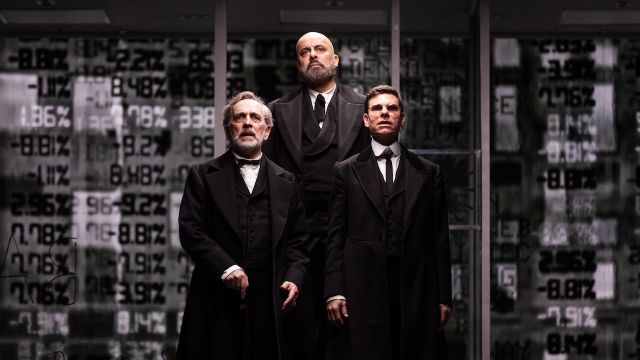The Lehman Trilogy
This triumphant theatrical saga about three Bavarian brothers immigrating to America in the 1840s and from a fabric shop in Alabama building a global investment bank has had a long gestation.
Originally a three act Italian play, adapted by British playwright Ben Power and directed for London’s National Theatre by Sam Mendes in 2018, applauded and translated around the world, this finely tuned epic is performed by just three remarkable actors.

Their stage is a revolving glass and chrome office, like the doomed bank’s final skyscraper in New York, designed by Es Devlin, surrounded by panoramic projections abstracting places and dreams. And pianist Cat Beveridge plays to one side adding lyrical expression.
The play begins with the collapse of Lehman Bros in 2008 which triggered the global financial crisis, but we soon leap back to the beginning.
Adrian Schiller, Howard Overshown and Aaron Krohn star as the three brothers and everyone else – their children and grandchildren, very incidental wives, acquaintances and fellow American traders and cigar chewing capitalists. They inhabit the major characters completely while simultaneously narrating to us who they are. All we have to do is keep up with their mesmerising rhythm and pace, which is a breeze: the three one-hour parts separated by two short intervals just fly by.

This expositional scripting may steal from some emotional involvement in the drama, but it allows for sweeping references to big themes. Brecht would get that.
After all, it’s the cruel tale of how merchant capitalism can transform into product monopolies and then high capitalism trading only in money, driven by the American Dream and worship of profit and individualism. The brothers practice proud Jewish beliefs and ceremonies; but that doesn’t last two generations. And it’s a mighty émigré story about outsiders desperate to join the Dream.
The Lehman brothers become “middlemen” trading in (slave-dependent) cotton then, after weathering the Civil War, expand into coal, iron and railways. But the investment bank deals not in products, but paper, and with the arrival of computers, just numbers.

The snapshots of generational shifts and squabbles to this end are engrossing; especially through the 1929 Crash when colleagues leap from their high glass box or blow out their brains. And nothing is learnt. But The Lehman Trilogy is a must to see and remember.
Martin Portus
Photographer: Daniel Boud.
Subscribe to our E-Newsletter, buy our latest print edition or find a Performing Arts book at Book Nook.

